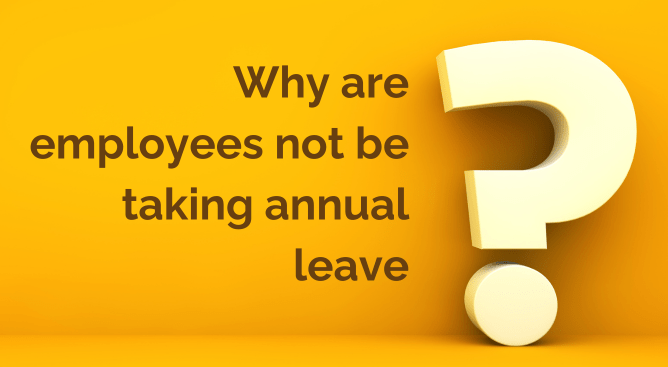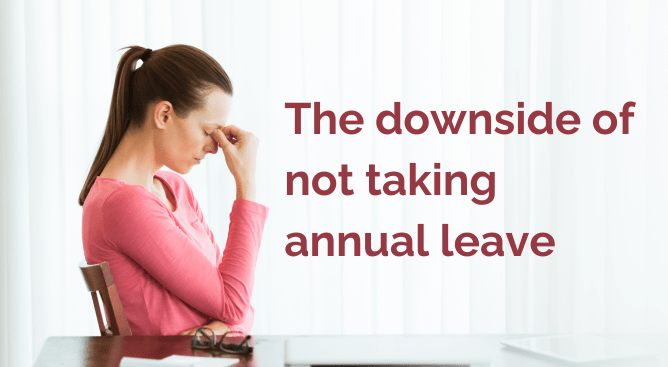We read with interest a report (Full annual leave unclaimed by 65% of employees) in HR Magazine of research conducted by Breathe, an HR platform for SMEs regarding workers who do not use their full allocation of annual leave.
Surveying 1,000 UK employees, the findings showed that as many as 65% did not use their full annual leave allowance with 17% of respondents recording an average of 5 or more days of unused holiday.
Unsurprisingly, not taking annual leave can have a number of negative effects as noted by Kylie Bennett, vice president of mental health clinical services and managing director of e-hub health at wellbeing and employee engagement platform Dialogue:
“Despite the importance of annual leave, many workers fail to utilise their full leave allowance, leading to burnout, decreased job satisfaction, and lower overall productivity.”
We’ve detailed below - and in more depth - the reasons why employees may not be taking annual leave and how this can negatively affect employers and employees.
High workloads and pressure
If employees feel that their workload is too heavy, there is a real fear that taking time off would cause them to fall behind. By taking that time off, these individuals worry that they are only going to feel more stressed on their return to work.
Those that manage teams may also believe that being away is going to negatively impact their team - adding to the mix, guilt and a fear of letting others down.
Cultural and organisational norms
In some workplaces, there may be an expectation that taking too much leave signifies a lack of commitment. If that expectation is an intrinsic part of the organisation’s culture, employees may feel that they simply feel too pressured to time off. Combine that with peer pressure and you have a situation whereby people decide that in order to fit in or avoid being judged, it’s easier not to take leave.
Job insecurity
If an employee is worried that management will take a dim view of them taking annual leave or that they will miss out on promotion or that their job is at risk - they will avoid doing so for fear of repercussions.
When there is a degree of economic uncertainty, individuals may believe that by not taking days away from the business will prove they are less expendable than others.
Poor planning
Obvious but needs mentioning is that some employees simply do not plan enough in advance and they then find themselves with time left at the end of the year. However, for smaller companies, it can be a challenge to schedule and co-ordinate leave between colleagues. Not ideal of course but planned time off can be delayed or cancelled so prior planning is key.
Financial considerations
Some employees may prefer to ‘buy back’ unused leave for extra pay where the option is available. For others, the cost of going away on holiday is too expensive, so they avoid using their leave completely.
Burnout
Those individuals who continue to work without breaks can suffer burnout which results in chronic stress, fatigue, and decreased motivation. Both well-being and productivity is compromised; an overworked employee will find it harder to focus, be creative and efficient. It’s therefore imperative that employees take regular breaks and vacations to regroup and reboot.
Poor work/life balance
Once work becomes all important, there can be a massive strain placed on personal relationships. Equally, once the individual recognises what is causing the strain, they will become more dissatisfied at work and gradually disengage.
Physical and mental health issues
The health related issues from not taking leave cannot be overestimated. The resulting stress can contribute to high blood pressure, heart disease, and weakened immune systems. Mental health is at its lowest and those that feel overworked can suffer from anxiety, depression and other serious mental health issues.
Reduced job satisfaction
Employees who don’t take time off may feel increasingly unfulfilled or trapped in their roles which can lead to decreased job satisfaction and higher turnover rates.
Negative impact on team dynamics
If annual leave is not valued, it can contribute to an unhealthy work environment and potentially lower overall team morale. It is also entirely possible that workflows will be affected when leave is finally taken by the overworked individual (through illness or burnout). Colleagues have to step in unexpectedly and take on more as opposed to working around structured and planned leave.
Summary
We’ve highlighted the various reasons why annual leave is avoided but by doing so, there are both negative implications for employers and employees. Organisations must take the lead and provide an environment where people can be healthier, more productive and more satisfied.
Firms should encourage a culture where taking time off is normalised and valued. As Tessa Boshoff, vice president of HR at language learning provider Wall Street English comments:
“To encourage full use of leave, employers should lead by example. When leadership visibly takes time off, it sets a positive tone. Implement a clear leave policy and regularly communicate about it.”



